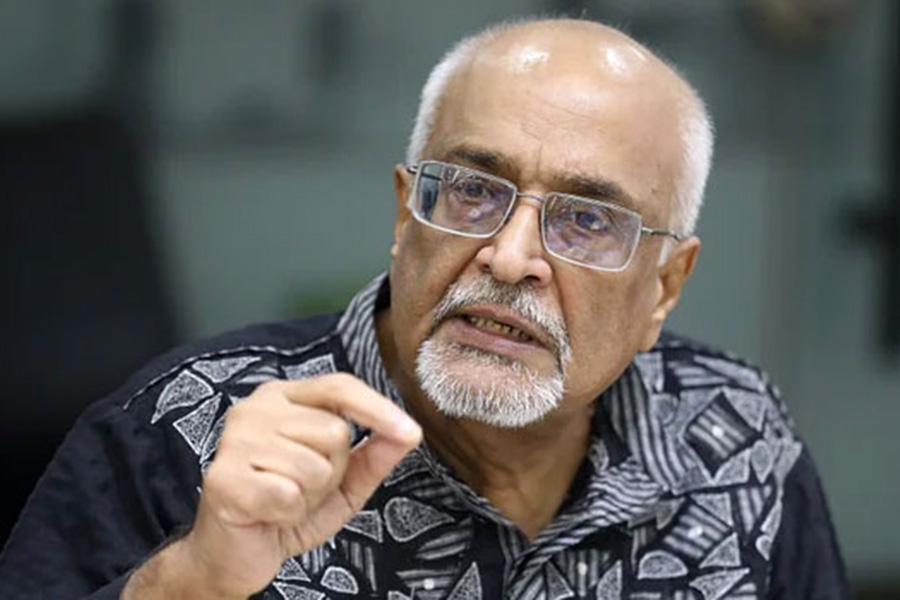
Published :
Updated :

Centre for Policy Dialogue (CPD) Distinguished Fellow Dr Debapriya Bhattacharya said inequality tends to increase during the International Monetary Fund (IMF) programme periods or for its conditionalities.
He also said Bangladesh's national budget has now become an "orphan" and the IMF has emerged as its "foster father".
"Numerous studies, including those from the IMF, have consistently demonstrated that inequality tends to increase during the IMF programmes or as a result of its conditionalities," he said while speaking at an event in the city on Monday.
Dr Debapriya was presenting his keynote at the pre-budget discussion - "How to reflect the concern of the disadvantaged groups in the upcoming national budget during the IMF programme period".
The CPD and the Citizen's Platform for SDGs, Bangladesh organised the programme.
Planning Minister M A Mannan was present as the chief guest, where former BNP lawmaker Barrister Rumeen Farhana, and Jatiya Party lawmaker Rana Mohammad Sohel also spoke.
CPD Board of Trustees Member Advocate Sultana Kamal presided over it.
Executive Director of BRAC Asif Saleh, Chief Executive Officer (CEO) of BUILD Ferdous Ara Begum, and Distinguished Fellow of CPD Professor Mustafizur Rahman participated as discussants.
Dr Debapriya further said the Bangladesh Bureau of Statistics (BBS) latest HIES report showed that not only income inequality, but consumption inequality also increased in the country during the period from 2016 to 2022.
"It is time to observe Bangladesh's position, as the government is fulfilling different conditions of the IMF here."
He questioned whether Bangladesh would implement all the terms and conditions of the IMF, or would go for reforms that are suitable for its socio-economic development without impacting the disadvantaged people.
"The good subsidies should be continued and the bad ones should be scrapped. The bad subsidies, like capacity charge for power producers, should be reduced and those funds should be transferred to agricultural inputs."
The CPD distinguished fellow also said it is imperative to provide adequate subsidies to the agricultural sector, specifically for fertilisers and pesticides.
"Actually, we (the economists) have been suggesting Bangladesh for a long time to conduct reforms, but the country is doing it under the IMF's pressure."
Dr Debapriya also called for extending mobilisation of local resources for ensuring a better budget for general people.
He asked why indirect tax would be the highest tax source in Bangladesh, rather than realising income tax from its nearly 20 million eligible people.
Same VAT for the wealthy people and for the non-solvent people is a serious disparity from the state, he added.
Replying to Dr Debapriya, the planning minister acknowledged the suggestion of extending the good subsidies while cutting the bad ones for the benefit of general people.
"You know that there are some influential well-off groups in the society, who somehow pursue the government and grab a portion of the subsidy money. But we are aware of it."
About high non-performing loans (NPLs) in the banking sector, Mr Mannan said: "There are several vested quarters in the country. When the government goes for chasing them, it needs to think about their power and sometimes needs to compromise."
"As a lender the IMF is giving us loans only, but we are not taking its conditions (which are) against us," he added.
CPD Executive Director Dr Fahmida Khatun, in her inaugural speech, said the IMF's conditions are impacting a section of people in Bangladesh, especially the poor and disadvantaged ones.
The farmers are severely affected due to the price hike of oil, electricity and fertilisers following the IMF's guideline, she opined.
Prof Mustafizur Rahman said there is no way but to extend the tax-GDP ratio through boosting revenue income - for ensuring a better budget for people.
Bangladesh's budget size of nearly Tk 7.0 trillion is not a big one at all in terms of the GDP, as it is much lower than other South Asian nations.
"The average budget size of the South Asian nations is nearly Tk 12 trillion. Bangladesh's budget size is much lower than that."
He called for spending more many in the socio-economic sectors, rather than in infrastructure development only.
Rumeen Farhana said as per the IMF's condition, the government is increasing the oil, electricity and fertiliser prices, which is affecting people severely.
"The current government's budget is a tik-tok recipe. It's a budget of looting. And for this, prices of all items here is comparatively higher than those in (other countries of) the world."
In the name of austerity, the government restricted import, which affected the economy and employment too, she opined.
Build CEO Ferdous Ara Begum said, "We want to see (continuation of) the good subsidies, rather than the bad subsidies."
Reduced public spending already affected the country's economic growth, she added.
FEkabirhumayan10@gmail.com


 For all latest news, follow The Financial Express Google News channel.
For all latest news, follow The Financial Express Google News channel.